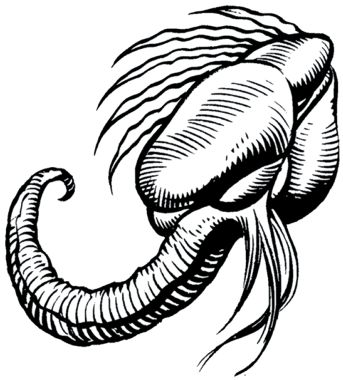

Lost Ships

| Climate/Terrain: | Phlogiston, wildspace, drifting, or on ships and other solid bodies |
|---|---|
| Frequency: | Uncommon (rare in wildspace) |
| Organization: | Clumps |
| Activity Cycle: | Any |
| Diet: | Omnivore |
| Intelligence: | Non- (0) |
| Treasure: | Nil |
| Alignment: | Nil |
| No. Appearing: | 2d20 |
| Armor Class: | 4 |
| Movement: | Fl 16(D) |
| Hit Dice: | 1 |
| THAC0: | 19 |
| No. of Attacks: | 1 |
| Damage/Attack: | 6 |
| Special Attacks: | Grip, 1 hp/round nutrient drain |
| Special Defenses: | Nil |
| Magic Resistance: | Nil |
| Size: | T(8"-2' overall length) |
| Morale: | Nil (treat as "Fearless" = 20) |
| XP Value: | 35 |
So named because they are primarily encountered in phlogiston, these hard-shelled, unintelligent creatures fasten themselves limpet-like to the surface of any object they encounter -be it ship, rogue planetoid, or drifting being, and slowly eat into it.
Flow barnacles look very much like immature krajen, but the two are not related. They also resemble planetbound, aquatic limpets and barnacles, but are usually at least the size of a human head. Spacefarers who see bone-colored triangular points protruding from their ship's hull where there was nothing before are warned that they have a flow barnacle -or 40- aboard. Flow barnacles are ivory or orange, often pinkish when young or wounded. When near death, they turn brown or black.
Combat: Flow barnacles will eat metal and organic matter alike -a menace to ships, valuables stored in chests, drifting characters encased in softwood, and to a lesser extent all spacefaring beings. They are neither agile nor cunning, but simply drift into characters, or convulse their bodies to expel a jet of captured atmosphere or moisture, and 'spurt' their way (at the listed movement rate) toward the nearest living thing.
If they hit, they will adhere with an almost-unbreakable grip and extend three parrot-like beaklets, which bite for 2 hp of damage each. They will then suck a further 1 hp of nutrients (e.g. bloodborne) each, per round until the prey's body is exhausted or the barnacle is detached.
A flow barnacle can be readily detached when dead. Removing a live barnacle requires a total strength application of 33 (i.e., several beings working together) for 1 round, and causes 2-5 points of damage to the barnacle's victim as it tears free.
Habitat/Society: Flow barnacles drift mindlessly in space and attach themselves to anything solid they encounter. They exist only to eat, straining all passing organic matter with their sticky feelers and absorbing available moisture and starlight.
When sufficiently nourished, flow barnacles develop an internal egg-sac of miniature, soft-shelled young. In conditions of warmth, moisture, and starlight, these are released into space.
Flow barnacles dislike excessive heat, light, or air (only excessive heat harms them in the same manner as humans are harmed) and tend to avoid all types of worlds.
Ecology: Some spacefaring creatures (including starving adventurers) eat flow barnacles, shattering their shells to get at the meaty, muscled body and foot underneath. Flow barnacles are said to be rubbery, and somewhat like poultry or squid in taste. Some humans are violently allergic to the flesh of flow barnacles (treat effects as a mild poison).
One in four flow barnacles form large, perfectly-shaped blue-white pearls ("moonpearls") within their glistening black, slimy amorphous inner bodies. They do this when an irritant piece of debris enters through their feeler hole. Each barnacle forms only a single pearl in its lifetime. The pearls take 2-8 years to form, and range in size from about the size of a man's thumb to about the size of a man's closed fist. They are very valuable (1,000 - 5,000 gp, depending on size, shape, and hue).
The hard, protective body-plates of flow barnacles are usable as shields and bucklers. The feeler-hole in the center is ideal for use as a mounting for a dagger-point, or as a firingport for an wheel-lock barrel (the plates are often permanently fixed to such weapons by giff and human pirates).
Magical sovereign glue is partially derived from distilled flow barnacle essence.
